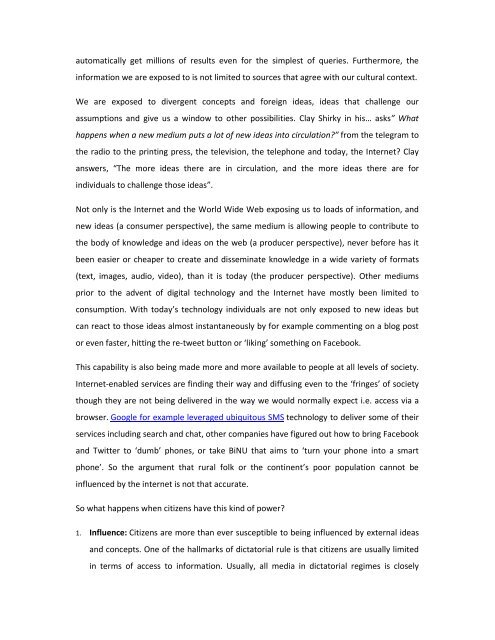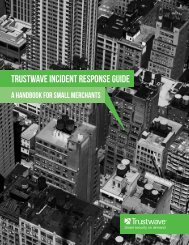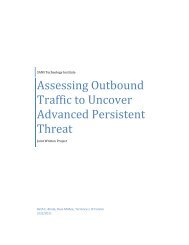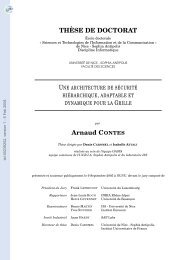gT4rH
gT4rH
gT4rH
You also want an ePaper? Increase the reach of your titles
YUMPU automatically turns print PDFs into web optimized ePapers that Google loves.
automatically get millions of results even for the simplest of queries. Furthermore, the<br />
information we are exposed to is not limited to sources that agree with our cultural context.<br />
We are exposed to divergent concepts and foreign ideas, ideas that challenge our<br />
assumptions and give us a window to other possibilities. Clay Shirky in his… asks” What<br />
happens when a new medium puts a lot of new ideas into circulation?” from the telegram to<br />
the radio to the printing press, the television, the telephone and today, the Internet? Clay<br />
answers, “The more ideas there are in circulation, and the more ideas there are for<br />
individuals to challenge those ideas”.<br />
Not only is the Internet and the World Wide Web exposing us to loads of information, and<br />
new ideas (a consumer perspective), the same medium is allowing people to contribute to<br />
the body of knowledge and ideas on the web (a producer perspective), never before has it<br />
been easier or cheaper to create and disseminate knowledge in a wide variety of formats<br />
(text, images, audio, video), than it is today (the producer perspective). Other mediums<br />
prior to the advent of digital technology and the Internet have mostly been limited to<br />
consumption. With today’s technology individuals are not only exposed to new ideas but<br />
can react to those ideas almost instantaneously by for example commenting on a blog post<br />
or even faster, hitting the re-tweet button or ‘liking’ something on Facebook.<br />
This capability is also being made more and more available to people at all levels of society.<br />
Internet-enabled services are finding their way and diffusing even to the ‘fringes’ of society<br />
though they are not being delivered in the way we would normally expect i.e. access via a<br />
browser. Google for example leveraged ubiquitous SMS technology to deliver some of their<br />
services including search and chat, other companies have figured out how to bring Facebook<br />
and Twitter to ‘dumb’ phones, or take BiNU that aims to ‘turn your phone into a smart<br />
phone’. So the argument that rural folk or the continent’s poor population cannot be<br />
influenced by the internet is not that accurate.<br />
So what happens when citizens have this kind of power?<br />
1. Influence: Citizens are more than ever susceptible to being influenced by external ideas<br />
and concepts. One of the hallmarks of dictatorial rule is that citizens are usually limited<br />
in terms of access to information. Usually, all media in dictatorial regimes is closely










